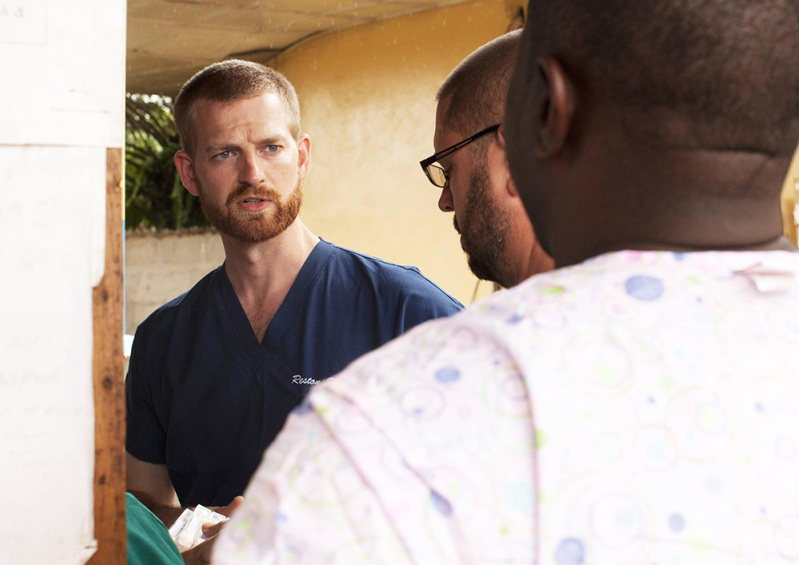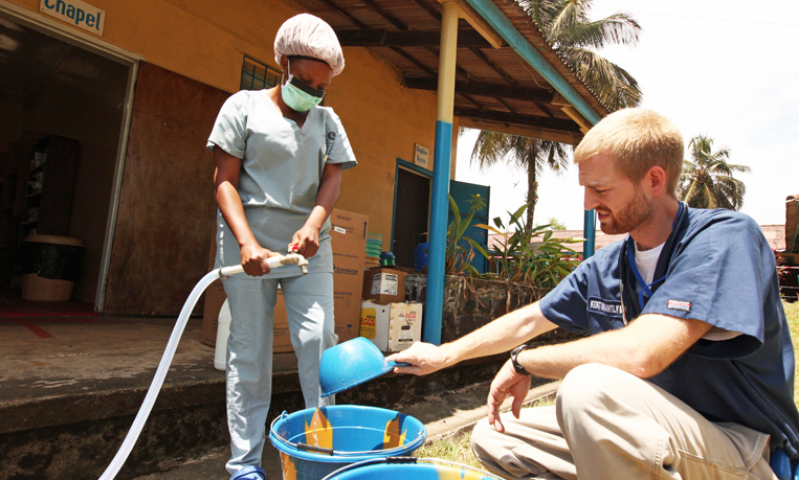

American doctor Kent Brantly recalls the experience of being diagnosed with and surviving an infection associated with the Ebola virus. He and his wife, Amber, recall the harrowing ordeal in a new book entitled Called for Life: How Loving Our Neighbor Led Us into the Heart of the Ebola Epidemic.
According to Shari Rudavsky of the Indianapolis Star, Brantly was in Liberia working as a medical missionary for Samaritan's Purse. While the first initial test was negative for Ebola, Brantly's second test, along with a fever, indicated that he had the virus in his system.
"I cried a lot; he was so matter of fact and calm," Amber said. "All I could do was cry and tell him how sorry I was for him and to stay strong and keep fighting. ... I wanted to be there beside him and be there to bring him chicken soup and water."
Rudavsky reported that the couple shared their memories of those days and the weeks that followed in an interview one year after Brantly fell ill. Brantly is an alumnus of the Indiana University School of Medicine.
"Our lives became an international news story," Brantly said, adding that he signed on to spend two years in Liberia as a medical missionary.
Both Kent and Amber, a registered nurse, told Rudavsky that they plan to continue medical mission work despite what happened to them.
"This has been a whirlwind year of illness, recovery," Brantly said. "We feel like we have been in a state of perpetual transition and we're trying to get our bearings so we can go back to that kind of work."
When he was infected with Ebola, Rudavsky pointed out that when Brantly arrived in the United States, he took the backdoor around the hospital to avoid the media trucks. The decision, according to Brantly, was a practical one, not a gesture of his strength.
"I was oblivious to the greater context of that situation," Brantly said. "That turned out to be an incredibly inspirational event for a lot of people who had been praying for me, that was an answer to so many prayers - that I was not only in America, I was strong enough to walk."
According to Rudavsky, Brantly's condition declined in hospital. However, he recovered by Aug. 20, 2014, and was allowed to exit the isolation unit after two negative blood tests.
"I hadn't had any human contact that wasn't coming through a gloved hand for four weeks, so to have that first contact be a hug from my wife, was really great," Brantly said.
Rudavsky reported that the Brantly family returned to Liberia last month for a week's visit. During that time, they met with Liberian president Ellen Johnson Sirleaf, who thanked Brantly for his service and returning to the country.
In an article published by Today last week, Brantly elaborated on how the return to Liberia went.
"We experienced a mix of emotions as we returned to our house on the beach: The trauma of all that occurred there last year - the patients we treated for Ebola, the overwhelming amount of death we encountered, my own life and death struggle against the villainous virus; the joy of times remembered," Brantly wrote.
Brantly added that he was full of "thankfulness," especially "for those who were spared; for the many people who cared for me and made my evacuation possible; for the chance to return as a family, together, to the place we called home for a brief period in time." He noted that although Ebola did not run rampant during his visit to Liberia, the virus emerged "only days after our return to the United States."
"Liberia has diagnosed six new cases - two people died, and four have recovered and been released from the treatment center," Brantly wrote. "And so the countdown for Ebola-free status begins again, while nearly 140 individuals are monitored as contacts of these new cases."
Brantly wrote that there were various ways Americans can help in the fight against Ebola in Africa. One of them included supporting "organizations that are still on the ground in West Africa trying to put an end to Ebola."
"Raise awareness among your friends and in your communities, and bring the ongoing disaster to the attention of your local, state, and federal government officials," Brantly wrote. "Pray for the people of West Africa. You cannot be apathetic towards people for whom you are earnestly praying."






